Yangtse River Cruise (Part 2) - Sunday, July 8, 2001
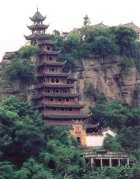 Another day on the boat. We got most of our laundry done on Saturday and had them do
Saturday's cloths today. We entered the first of the three gorges in the morning. We
then docked and got on smaller boats to go up the lesser three gorges. They were really
quite cool, much more so than the Yangtse, generally.
Another day on the boat. We got most of our laundry done on Saturday and had them do
Saturday's cloths today. We entered the first of the three gorges in the morning. We
then docked and got on smaller boats to go up the lesser three gorges. They were really
quite cool, much more so than the Yangtse, generally.
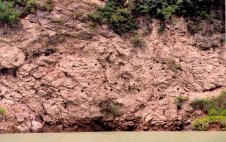 There were two rows of square holes a couple of feet into the walls of the cliffs on the
starboard side as we entered the gorges. The lower set was about ten feet above the
water, and the upper set about five or six feet above that. The lower set were the
anchor points for an old wooden walkway that used to traverse the side of the gorge. The
walkway was built about 2,000 years ago. It was used for communication and to transport
troops and salt water (used for the salt that was extracted and used to season and
preserve food), which was transported via bamboo pipes. The top set of holes were used
for a covering, as well as to provide support.
There were two rows of square holes a couple of feet into the walls of the cliffs on the
starboard side as we entered the gorges. The lower set was about ten feet above the
water, and the upper set about five or six feet above that. The lower set were the
anchor points for an old wooden walkway that used to traverse the side of the gorge. The
walkway was built about 2,000 years ago. It was used for communication and to transport
troops and salt water (used for the salt that was extracted and used to season and
preserve food), which was transported via bamboo pipes. The top set of holes were used
for a covering, as well as to provide support.
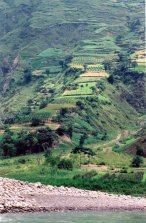 It was quite hot and sunny, so the crew closed the roof of the small boat, which was nice
in the shade. There was a curve in the river that went around a small village. The river
narrowed and had rapids around the curve so single-engine boats could not make it around
with a load of passengers. So, they would drop the passengers off and they would have to
walk up the hill -- past the many vendors -- through the village -- passing the many hawkers
-- and down to the other side, where there were more vendors and hawkers. Then they would
get back on their boat, which would have made it around the curve. Fortunately, we had
a dual-engine boat and were able to traverse the rapids and were, thus, spared this ordeal.
It was quite hot and sunny, so the crew closed the roof of the small boat, which was nice
in the shade. There was a curve in the river that went around a small village. The river
narrowed and had rapids around the curve so single-engine boats could not make it around
with a load of passengers. So, they would drop the passengers off and they would have to
walk up the hill -- past the many vendors -- through the village -- passing the many hawkers
-- and down to the other side, where there were more vendors and hawkers. Then they would
get back on their boat, which would have made it around the curve. Fortunately, we had
a dual-engine boat and were able to traverse the rapids and were, thus, spared this ordeal.
We continued up the river and saw some reeses monkeys. We got up to the end of the last
of the lesser three gorges and stopped at a small rock beach. All of the Taiwanese
tourists jumped out and collected rocks to bring back home. Ian told us that the
Chinese are very in tune with nature and like to collect rocks and other natural objects
when they travel.
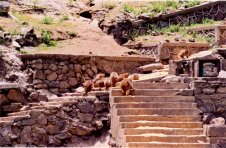 Unsurprisingly, there were hawkers at the little beach where we stopped the boat and
turned around. It was almost as if they knew we would be stopping there. They were
selling all of the normal types of stuff, and rock animals, only rock pigs I think.
Anne and I stayed on the boat but when one of the other passengers returned (Sandra,
who was traveling around China for a month with a couple of Chinese friends), she
told us that the woman was selling them for ¥8 ($1.00). Anne wanted to get one, and
I told her I thought we could get one for ¥7 as the boat was about to leave. We only
had two ¥1 notes and a couple of ¥5 notes, so we gave ¥7 to one of the other passengers
by the window to give to the woman, who was at first reluctant. However, as the boat
started to move she became more enthusiastic.
Unsurprisingly, there were hawkers at the little beach where we stopped the boat and
turned around. It was almost as if they knew we would be stopping there. They were
selling all of the normal types of stuff, and rock animals, only rock pigs I think.
Anne and I stayed on the boat but when one of the other passengers returned (Sandra,
who was traveling around China for a month with a couple of Chinese friends), she
told us that the woman was selling them for ¥8 ($1.00). Anne wanted to get one, and
I told her I thought we could get one for ¥7 as the boat was about to leave. We only
had two ¥1 notes and a couple of ¥5 notes, so we gave ¥7 to one of the other passengers
by the window to give to the woman, who was at first reluctant. However, as the boat
started to move she became more enthusiastic.
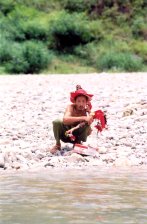 There was no village in sight, so it was unclear where the peddlers came from. However,
we were the last boat (odd, I know) and as we pulled away the vendors all started walking
along the rocks by the bank back toward whatever village they came from. There were a
number of kids playing in the river, many of whom had life jackets on. The water in the
lesser three gorges was a beautiful turquoise color, as opposed to the chocolate brown
of the Yangtse.
There was no village in sight, so it was unclear where the peddlers came from. However,
we were the last boat (odd, I know) and as we pulled away the vendors all started walking
along the rocks by the bank back toward whatever village they came from. There were a
number of kids playing in the river, many of whom had life jackets on. The water in the
lesser three gorges was a beautiful turquoise color, as opposed to the chocolate brown
of the Yangtse.
We got back to our ship and had a late lunch. In the afternoon we headed into the second
and third gorges. A rather interesting experience that afternoon happened as a bunch of us
were standing up on deck checking out the scenery. We saw a dead body, face down with a
life jacket on, floating down the river. It missed out ship by a few yards. To say the
least, it was a little disconcerting. Someone told the crew about it and was told that the
local government would take care of it. It really made me think about the different value
that China and the West place on human life.
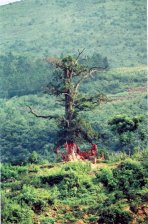 I have always felt that if something happened to me -- I got lost in the woods, my airplane
crashed, I fell off of a boat -- that people would try to rescue me, or at least come
searching for me. And they would probably find me . . . at least eventually. I don't
really get the same feeling in China. Maybe for a tourist, diplomat, or party member, but
not for an average person. Perhaps there are simply too many people to begin with, but
I think it is more than that.
I have always felt that if something happened to me -- I got lost in the woods, my airplane
crashed, I fell off of a boat -- that people would try to rescue me, or at least come
searching for me. And they would probably find me . . . at least eventually. I don't
really get the same feeling in China. Maybe for a tourist, diplomat, or party member, but
not for an average person. Perhaps there are simply too many people to begin with, but
I think it is more than that.
The floods have already begun and the river below the dam is five meters lower than the
river above the dam. When the first stage of the dam is completed in 2003, the water will
rise from its current level (65 meters above sea level) to 135 meters above sea level. The
hydro-electric turbines will start producing electricity, which will be sold to fund the
rest of the project. Chinese officials project the cost to be $40 billion, half for
relocating people and half for actual construction. They say that 1.1 million people, two
cities, and over 100 towns and villages will be moved. Western experts estimate that around
2 million people will be relocated.
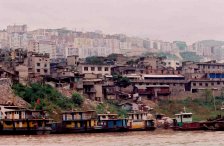 The government built new cities farther up the hillsides, and people will be given a
three-month window in which to move into their new homes. The new apartments are larger,
and obviously newer. Our Chinese guide said that she will be moving into a 1000 square foot,
three-bedroom, two-bath apartment. Presumably this would be shared with her parents and
brother, although it was not clear how many people would be living there. The rising water,
of course, will flood a great deal of arable land. In addition, the land farther up the
hillsides is not as good for farming. The government is paying for wheat and other staples
to make up for any shortfall.
The government built new cities farther up the hillsides, and people will be given a
three-month window in which to move into their new homes. The new apartments are larger,
and obviously newer. Our Chinese guide said that she will be moving into a 1000 square foot,
three-bedroom, two-bath apartment. Presumably this would be shared with her parents and
brother, although it was not clear how many people would be living there. The rising water,
of course, will flood a great deal of arable land. In addition, the land farther up the
hillsides is not as good for farming. The government is paying for wheat and other staples
to make up for any shortfall.
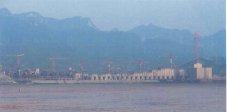 In 2009, the second, and final, phase will be completed. At that point the water will rise
up to 175 meters above sea level. There are signs on the hillsides for 135 meters and 175
meters to let you know how high the water will rise. It is interesting to see te old grey
buildings at the water-line and the nice new, clean buildings on top of the hillside. There
are also lots of deposits of coal, old factories, and buildings. Obviously, this will all be
cleaned up before they flood the place. After all, they wouldn't just let the water carry all
of that junk downstream . . . right?
In 2009, the second, and final, phase will be completed. At that point the water will rise
up to 175 meters above sea level. There are signs on the hillsides for 135 meters and 175
meters to let you know how high the water will rise. It is interesting to see te old grey
buildings at the water-line and the nice new, clean buildings on top of the hillside. There
are also lots of deposits of coal, old factories, and buildings. Obviously, this will all be
cleaned up before they flood the place. After all, they wouldn't just let the water carry all
of that junk downstream . . . right?
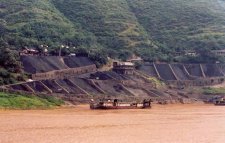 The tour guide told us that at least fifty people died each year while working on construction
of the dam (hmmmm, 18 years times 50 people equals 900 people). he then mentioned that if
we were lucky we might see a dead body floating down river. I am not sure how that was supposed
to qualify one as lucky, other than :at least it wasn't me." After seeing the dead body
floating by I didn't feel significantly luckier.
The tour guide told us that at least fifty people died each year while working on construction
of the dam (hmmmm, 18 years times 50 people equals 900 people). he then mentioned that if
we were lucky we might see a dead body floating down river. I am not sure how that was supposed
to qualify one as lucky, other than :at least it wasn't me." After seeing the dead body
floating by I didn't feel significantly luckier.
We saw quite a variety of ships, both cruise ships like ours, and all types of merchant and
passenger ships. later, we went through the ship lock in the old dam -- 20 meters down -- and
then we whiled away the hours in the lounge playing "pass the pigs" until they kicked us out
at 11:00 p.m.
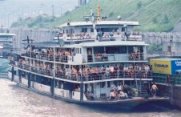
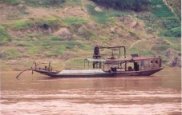
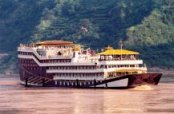
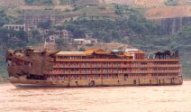
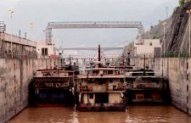
The major purposes of the dam are flood control, electricity, and navigation. The old dam
is sufficient to control the "10-year" floods. However, the new dam is capable of controlling
the "100-year" floods. These 100-year floods are capable of killing hundreds of thousands
of people. This puts the 900 people who are likely to die building the dam into some
perspective.
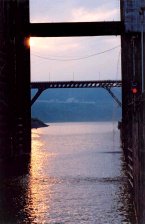 The dam will also produce approximately 9% of China's electricity. The calmer, wider, and
deeper waterway will also provide easier navigation. The guide told us that three ships sank
in a one month period. Two ran aground and the other caught fire. One of the ships that ran
aground was being piloted by the frst mate, who was not as experiencedas the Captain. After
turning the ship around to dock he got confused and went to the wrong side of the marker.
The dam will also produce approximately 9% of China's electricity. The calmer, wider, and
deeper waterway will also provide easier navigation. The guide told us that three ships sank
in a one month period. Two ran aground and the other caught fire. One of the ships that ran
aground was being piloted by the frst mate, who was not as experiencedas the Captain. After
turning the ship around to dock he got confused and went to the wrong side of the marker.
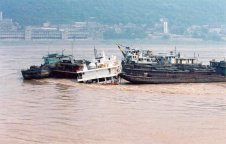 We were told that we need not worry because the tourist ship captains were much better than
the normal ferryboat captains. Once the dam is completed, they will not even need captains.
They will be able to run on auto-pilot, just like at sea. aparently, at the cocktail party,
which I skipped, everyone was told that our Captain was so good that we didn't need life
jackets. Of course, something similar was told to those aboard the Titanic . . .
involving life boats I think?
We were told that we need not worry because the tourist ship captains were much better than
the normal ferryboat captains. Once the dam is completed, they will not even need captains.
They will be able to run on auto-pilot, just like at sea. aparently, at the cocktail party,
which I skipped, everyone was told that our Captain was so good that we didn't need life
jackets. Of course, something similar was told to those aboard the Titanic . . .
involving life boats I think?
One little side note. Last night we docked overnight so that we would sail through the
three gorges while it was light outside. At 4:30 a.m. this morning the ships horns blew
to announce our departure. Ships' horns really are quite loud.
| Home | China Journal |
© 2001 John Eisinger. All rights reserved
Please report any problems to me.
 Another day on the boat. We got most of our laundry done on Saturday and had them do
Saturday's cloths today. We entered the first of the three gorges in the morning. We
then docked and got on smaller boats to go up the lesser three gorges. They were really
quite cool, much more so than the Yangtse, generally.
Another day on the boat. We got most of our laundry done on Saturday and had them do
Saturday's cloths today. We entered the first of the three gorges in the morning. We
then docked and got on smaller boats to go up the lesser three gorges. They were really
quite cool, much more so than the Yangtse, generally.













